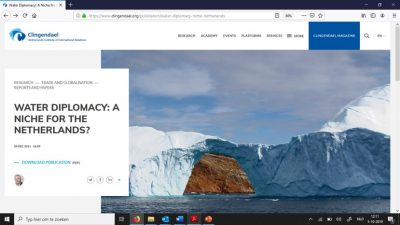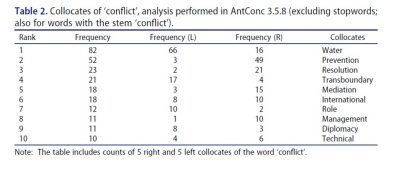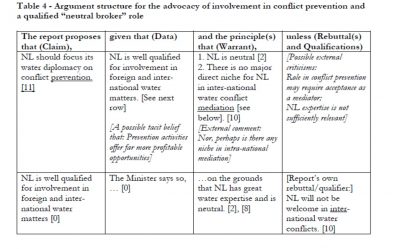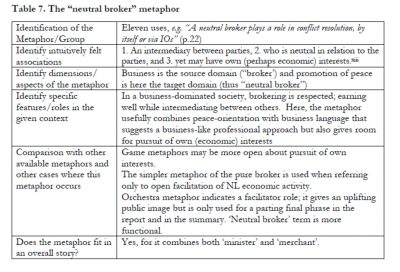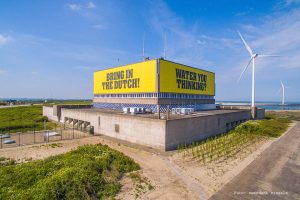 This post presents findings from our latest article published in International Journal of Water Resources Development.
This post presents findings from our latest article published in International Journal of Water Resources Development.
Introducing Water Diplomacy
“An old cliché about who the Dutch really are – a mix of merchants and [religious] ministers — applies to foreign policy as well” (Lechner 2008: 247)
Water conflicts loom large in the present world. Think about Israel/Palestine/Jordan, India/Pakistan, Turkey/Syria/Iraq, US/Mexico and conflicts in the Mekong and the Nile basins. There are many more on a smaller scale. Water diplomacy seems to be the only solution to prevent bloodshed and ensure regional stability.
Two things are essential to understand water diplomacy. First, there is no multi-lateral and universally accepted system in place to manage transboundary water conflicts and tensions — the two UN conventions (New York 1997 and Helsinki 1992) failed to build a global regime, although partly succeeded in advancing some governance norms. This gave space for so-called “third-parties” — states, NGOs, foundations — to mediate and resolve conflicts elsewhere. Secondly, such “third-parties” explicitly pursue self-interest when engaging in water diplomacy. This means pursuing the goals of enhancing own international prestige, facilitating exports of goods and services, inserting own authority, and shaping global governance norms. Merrill Lynch and the Bank of America estimated that the water industry market could be worth US$800–1000 billion by 2030 and water diplomacy is just one area where countries compete to get a share of that huge cake. They do so by promoting their own private sector through technical cooperation, and promoting own image through pursuing venues and mechanisms of conflict resolution. The Netherlands is one such country with global aspirations in the water sector including water diplomacy.
The Netherlands in search of a “niche” for water diplomacy
Third-party water diplomacy offers opportunities for the Dutch water sector. It may win a lot of good will internationally and with some powerful riparian sides if there is successful mediation or prevention of conflicts in transboundary basins. In some strategically important cases, such as the Nile and the Mekong, technical cooperation is an important element of transboundary cooperation with such services as dam construction and maintenance, early warning systems for floods or extra-ordinary releases, exchange of monitoring and water flows data and information. Setting these systems up can generate revenues. Furthermore, there are indirect ways of wielding influence internationally — for example through setting global norms of “good transboundary governance” that would be more accepting of private involvement, or that would allow for an internationally funded river basin organisation to play an active role. Yet another possible pathway to power is in promoting particular venues where transboundary disputes can be discussed, such as the Permanent Court of Arbitration and the International Court of Justice, both conveniently located in The Hague. If these courts can wield power over transboundary conflicts and the Netherlands government can wield some influence over the two courts (by virtue of being a host country), then there is a clear interest for the Netherlands to get involved.
However, aggressive promotion of own self-interest in water diplomacy raises some critical questions. The goals of helping achieve piece, pursuing economic self-interest and geo-political influence may, at least in some cases, be conflicting with each other. How to gain acceptance of the riparian parties involved as well as the international community when asserting own authority and interests may be seen as partial, both by parties to a dispute and observers? So the central question of our paper is as follows:
How does the key 2011 advisory report on water diplomacy navigate tensions between presenting the Netherlands as neutral and yet identifying and exploring opportunities to benefit economically from water diplomacy?
The report in focus is the 2011 advisory report by Clingendael Institute of International Relations, a government sponsored think-tank that advises the Ministry of Foreign Affairs of the Netherlands. Its title is “Water Diplomacy: a Niche for the Netherlands?” and it is authored by Jan Rood and Ruben van Genderen.
We applied four discourse analysis techniques in order to understand the rhetorical tools that the report employed in managing the tensions, with the focus on the theme of neutrality. Our research procedure was as follows:
0 – close, repeated reading and analysis of the context(s);
1 – content analysis (frequency tables; collocations for key terms);
2 – argumentation analysis following the approach of Scriven-Toulmin-Gasper (e.g. Gasper 1996, 2000);
3 – metaphor analysis in formats by Schmitt (2005) and Steger (2007);
4 – frame analysis following the WPR format developed by Bacchi (2009).
The methods were used in this sequence. #1 gives initial orientation and questions. #2 investigates key sections in detail. #3 explores how central issues are finessed. #4 synthesizes, based on #1-3.
Content Analysis
After getting familiar with the report and having read extensively on the context, we run word frequency tests and found that “diplomacy” (152 counts) is mentioned more often than “conflict” (112 counts). At the same time, “The Netherlands” (138 counts) was mentioned more frequently than the “UN” (86 counts). Together with collocation analysis and concordance analysis we came to a conclusion that the report is not interested in deeper understanding of the conflicts in specific river basins and ways of resolving them. Instead, its primarily concern is the promotion of The Netherlands as a diplomacy agent with a specific “niche”. Through collocate analysis, we also saw that there is much more emphasis on “conflict prevention” than on “conflict resolution”, which made us curious to explore this finding in more detail. One of the tables from the article is presented below.
Word Frequency Count (excluding stopwords such as “the,” “an,” “and”)
Collocation Analysis for words with the stem “conflict” (exluding stopwords and counting 5R and 5L collocates)
Argumentation analysis
Once we established the keywords of the report and the assumed focus on conflict prevention, we looked for explicit reasoning along these lines. We took one extract where the authors openly but carefully contradict the minister of development cooperation (back in 2011 this was Ben Knapen) and make the point that the Netherlands (abbreviated as NL) is better fit to engage in conflict prevention and not conflict resolution. Below is the extract from the report.
The Minister for Development Cooperation recently argued that the Netherlands could function as mediator in national and transboundary water conflicts due to its technical expertise of water governance and its neutrality (Knapen, 2011)vi. Regarding national water conflicts, this is certainly the case since Dutch water governance experts and hydrologists are advising states such as China, Syria, Egypt, Bangladesh, and many others. The qualitative research gathered through interviews with and questionnaires from water experts and policy advisors indicates a more complex answer regarding transboundary water conflict mediation. Water hegemons, such as India, China and Turkey, are often not keen on third-party involvement. The Netherlands is generally perceived as neutral, but riparian states still favour UN parties or the World Bank as a facilitator or a mediator. The MFA is, therefore, in general advised to focus on conflict prevention, although two options remain for the MFA if it wants to play a part in water conflict resolution.
We applied analysis of the logic and pragmatic assessment of the meanings communicated in this extract viewed in the context of the whole report. The basic format is to look at claims, data that supports the claim, warrants (logical links between data and claims) and possible counter-claims (Scriven-Toulmin-Gasper). This analysis confirmed that there is an effort to establish the Netherlands as a credible, authoritative, capable and willing actor to be involved in conflict prevention. One of the possible benefits of this, along with smaller risks compared to mediation, is the larger role to play for the vast Netherlands Water Sector in all kind of activities that may go under “conflict prevention”. We also observed that water engineering and management prowess of the Netherlands at home is viewed as a pre-requisite to engage in water diplomacy internationally -not a self-evident link in itself. And most importantly, it is the notion of neutrality that proved to be a key enabler of the Dutch water diplomacy efforts, both present in the extract that we looked at and in the whole document at large. The table below illustrates some key claims as presented in the article.
Metaphor Analysis
This lead us to look at key metaphors in the text as linked to the role of the Netherlands as a water diplomacy agent. We identified three: “neutral broker”, “conductor of an orchestra” and games metaphors such as “win-win”, “zero-sum game”, “player”. We followed Steger’s guidance for metaphor analysis as follows: 1.Identify the metaphors used; via ‘repeated reading’; 2.Prioritise some, e.g. by criteria of: repeated use; elaboration by the user; relatedness to a key topic; ‘contrast’/unexpectedness; emotional content/ delivery. 3.Study the metaphor, e.g. using Lakoff; & 6 methods/qns (facing) 4.Study the metaphor-in-the-specific-context/case. Example of one key metaphor analysed in detail is presented below.
The report relies considerably more on the “neutral broker” metaphor (11 uses) than on other metaphors. This links from a source domain of business deals to a target domain of promoting peace (Kövecses, 2002). “Broker” originally means not just an intermediary but a business dealer. “A broker is a person or firm who arranges transactions between a buyer and a seller for a commission when the deal is executed. The phrase “neutral broker” aptly hints at a desired combination of minister/preacher and merchant: a state that will act as an international hub, enabler, norm entrepreneur and mediator, promoting peace while at the same time actively promoting its own country’s businesses. It operates in the spirit of the bourgeois world-order in whose birth the Netherlands was a central arena and ‘player’: the world-order constructed after Europe’s 17th century wars of religion. As Albert Hirschman articulated it aptly, in it “the passions” that underlie violent conflict are supposed to be tamed by and redirected into “the interests” that drive the wheels of commercial market society.
Frame Analysis
Finally, we perform the frame analysis as a synthesis tool in order to understand how the report frames the problem, what solution it offers and how this solution is legitimised. The earlier three techniques provide input or corroboration for this analysis. We use the technique designed by Carol Bacchi and called “What is the Problem Represented to Be?” in order to guide our analysis. Our major finding is that there are 3 key effects of representation produced by the report (question 5 of WPR):
a) The representation of attempted water conflict resolution as risky brings a focus on conflict prevention. This steers the Netherlands external involvements towards a larger field with more economic opportunities: both technical and governance related.
b) The perception that there are many developing countries in the world without technical knowledge and expertise in water governance and diplomacy, hence requiring external, specifically Dutch, assistance – with “economic spin-offs” for the Netherlands.
c) The presentation of the Netherlands as having a reputation for neutrality, which is conducive to use of the “neutral broker” concept.
Conclusions & Importance of the Study
Taken together, this analysis demonstrates how the report makes an argument for conflict prevention efforts and not conflict mediation (unless involved with other UN parties). It also makes a clear argument that the Netherlands has something to win economically from water diplomacy in the role of a “neutral broker”. Any potential conflicts that may arise between self-interest and public good are made invisible here. Finally, the report frames the Netherlands as capable, neutral and willing to engage internationally (with partners in the Hague and around the world). At the same time, it implicitly frames the world (Global South basins) as lacking expertise and experience, in need of third-party mediation/involvement — and hence the “niche” for the Netherlands that has something to win from such involvement. No serious engagement with counter-arguments on that front have been detected. This orientation is perfectly in line with the mercantilist order and globally competing nations that are there to uphold own self-interest.
As a summary, three conclusions emerge from the paper.
1.The language of neutrality is used to legitimize the Netherlands’ efforts to merchandise its water sector next to building peace. Of the metaphors used — “games” (‘players’, ‘zero-sum’, ‘win-win’), “orchestra”, and “neutral broker” – the neutral broker metaphor was the most serviceable and most relied upon.
2.The focus on conflict prevention and not resolution seems to match the desire of the Netherlands to broaden up the playing field for its private sector. This is in line with the NIWA (2019) and IWA (2016); but it needs further study.
3. (a) This overall methodology is relevant for studying soft power and branding in global hydro-hub creation and maintenance.
(b) The set of methods is feasible for use by non-experts (with care).
Finally, a methodological note is important. With a clear procedure and cooperative engagement of methods, we illustrated how this type of discourse analysis may be applied to key policy texts by non-experts in linguistic or discourse analysis fields. We hope such research will follow.
Reference:
